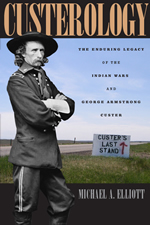Custer and Native American Identity

Tuesday’s Los Angeles Times published a review of several recent books about the battle of Little Bighorn, George Armstrong Custer, and the deep impact that this most famous military defeat has had on America’s cultural consciousness. Discussing Michael A. Elliott’s Custerology: The Enduring Legacy of the Indian Wars and George Armstrong Custer the Times‘ Allen Barra writes:
[In researching his book] Elliott traveled from Custer’s childhood home in Monroe, Mich., to the Little Bighorn Battlefield in Crow Agency, Mont., and visited every related museum and monument in between. Particularly intriguing is a photograph of the mountainside memorial of Custer’s final foe, Crazy Horse, a work in progress, behind a model of the proposed completed sculpture.
The fact that continued fascination with Custer in turn stimulates an increasing interest in Crazy Horse’s people is not ignored by Elliott. He writes that for English-born Custer re-enactor Tony Austin, “portraying Custer’s life means that one can resurrect an attitude toward American Indians that combines respect with combat, admiration with military opposition.”
Custer himself, Elliott claims, “would have never believed that there would be Indians who thought of themselves as Indians in the twenty-first century.” Modernity, Custer and his contemporaries believed, would “crush the indigenous population … either physically through extermination or spiritually through assimilation.” That the descendants of the warriors of Little Bighorn might be using Custer’s life and death “to help them understand what it means to be an Indian in the twenty-first century constitutes one of American history’s most elegant, and least appreciated, ironies.”
Read the rest of the review on the L.A. Times website.
Also read an excerpt from the book.